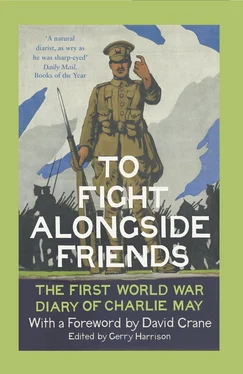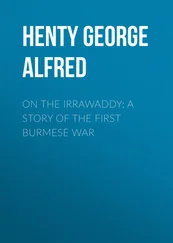There was the doctor, Murray, Worth, Bill Bland, ‘Gommy’, Meller and myself and we sat round a table and sang the old mess-songs … It was tip-top and we all loved each other. There are so many new faces with us now and so many missing that the battalion hardly felt the same – and one cannot let oneself go with the new like one loves the old boys. I would that the battalion was going over with all its old contingent. How certain we should all feel then. Not that the new stuff is not good. But we knew all the others so well.
Above all though, for Charlie May, England was his wife Maude and their baby daughter Pauline; his diary is an extended and deeply moving love-letter to them. He had married Bessie Maude Holl in February 1912 when they were both twenty-three, but it was really only when he had to leave her and their new daughter, that they both seem to have realised – not how much they had loved each other, that never seems to have been in any doubt – but how astonishingly fortunate they had been in their brief, shared lives. ‘I thought of you as we strolled there, Lizzie with her reins slack wandering where she would and at her own pace,’ he wrote after one afternoon spent riding through a world of larch and birch clumps and wood pigeons still untouched by war – a passage in which images of Maude, England and a deeply felt sense of natural beauty fuse into one to take us as close as we can probably get to what it was that Charlie May was ready to fight and, if necessary – un-heroically, reluctantly but matter-of-factly – die for.
And I longed that you could have been with me, for I know how you would have loved it and how happy we two would have been. The green rides of Epping came back to me in a flash. You in that black spotted muslin dress you used to wear looking cool and lovely so that I just asked nothing more than to walk along and gaze at you dumbly, like any simple country lout gazes at his maid.
‘I do not want to die,’ he wrote; the thought of never seeing Maude again, of his daughter growing up and never knowing him, turned ‘his bowels to water’. But as the sporadic tours in the front-line trenches and the training behind the lines intensified in the build-up to the expected great summer offensive of 1916, there became less and less room for the ‘personal’. It is impossible to read these diaries and the first casual mention of the Somme without a sense of grim foreboding, and yet at the same time there is no missing the growing excitement at the approach of battle, at the movement of troops, the massing of guns in preparation for the preliminary bombardment and the submersion of the individual in a mighty collective whole. ‘It is marvellous,’ he wrote, ‘this marshalling of power. This concentrated effort of our great nation put forward to the end of destroying our foe. The greatest battle in the world is on the eve of breaking. Please God it may terminate successfully for us.’
There had been ominous warnings for the 22nd in the weeks leading up to the Battle of the Somme – a night raid with heavy casualties that showed the German wire uncut by the artillery, dud shells and ‘whispers’ that ‘our ammunition … is not all that it should be’ – but the grief that the word ‘Somme’ would conjure up for thousands of families whose sons had flocked to enlist in the autumn of 1914 belongs to retrospect. To Charlie May the word meant only a glimmering river – ‘full of sport’, he thought it should be, as he set off to buy his fishing tackle in Corbie – idling quietly through a landscape of ‘tiny panoramas’ of bullrushes and pampas grass, of ‘brown trees, blue, sparkling waters, white, brown, red, blue and purple houses clustering around their grey churches’. The larger picture, the overall strategic concerns and aims that lay behind the Somme offensive of July 1916 – Verdun, the Eastern Front, the eternal illusion of a ‘break-through’ – were of no concern. His Great Battle – the battle that would mark ‘the beginning of the end’, he told Maude on 15 June – would be what he called the ‘Battle of Mametz’, and his responsibilities were to the men around him and the wife and daughter who were never out of his thoughts.
On the morning of the first of July, after a week of preliminary bombardment, the 22nd were part of the 7th Division, and their sector lay opposite the heavily fortified village of Mametz, on the southern edge of the Germans’ Fricourt Salient, east of Albert. On their left the British line stretched up northwards through names that would soon be seared into the national consciousness – Fricourt, La Boisselle, Thiepval, Beaumont-Hamel – and on their right, eastwards and south to Maricourt, the junction with the French army and the River Somme itself. But for the company commander of B Company, the war had shrunk to the ‘900 yards of rough ground’ in front of him and the inner battle to live up to the standards he had set himself. ‘My one consolation,’ he wrote to his wife, in one final, simple and binding credo,
is the happiness that has been ours … My darling, au revoir . It may well be that you will only have to read these lines as ones of passing interest. On the other hand, they may well be my last message to you. If they are, know through all your life that I loved you and Baby with all my heart and soul, that you two sweet things were just all the world to me. Pray God I may do my duty, for I know, whatever that may entail, you would not have it otherwise.
The diary would be the last word she had from him. He did his duty, and so, too, did the battalion of whom he was so proud. ‘They are all so clean-cut and English as you know so well, my own,’ he had written to his wife on the eve of their departure for France; ‘I feel confident they’ll go when the chance comes. Please God the 22nd may carry the old Regiment’s name another rung up the ladder of fame.’ His soldier’s prayer was answered. If his optimism in the prosecution of the war was unfounded, his confidence in the courage of his men was not. He would not live to know it – his last moments are preserved here in his wife’s desperate, unbearable need to know every detail of his end – but Mametz was taken and, almost uniquely, the battalion’s targets all met. It had been, though, at a shocking price. Of the 796 officers and men of the ‘7th City Pals’, 472 were either killed or wounded on that terrible 1 July, a day that would cost the British Army 19,240 dead and 57,470 casualties in all. May’s Battle for Mametz was over but the Battle of the Somme had only begun.
David Crane
February 2014
Prologue
‘A pippy, miserable blighter’
7–10 November 1915
Lark Hill, i7th November ’15
I am going to commence this book this evening because now I have seen you for the last time before going abroad and I will therefore be unable to make [a] personal confession to you again for some time to come.
I arrived back here depressed from my leave-taking from you and Baby and found little to ease the sadness of my soul. More than half our fellows are out and the mess is full of the 23rd men, come over to say ‘goodbye’. iiYou know how little I love them and tonight they put me in no mood to reconsider my affection. Some are singing ragtime with deplorably poor success, whilst the remainder talk ‘shop’ in loud and raucous tones. They are hateful people and I wish they would go home and allow us to make our final arrangements in peace and quietude.
Our kits have all to be on the transport wagons by 6.15 a.m. tomorrow and we follow on Tuesday. I will be jolly glad when we get on the move, as will all the rest of our fellows. We believe we are bound for St Omer. I wonder!
I wrote to you this evening but not at length because I could not. I’m such a pippy, miserable blighter that it would be a sin to convey it to you, and just when you will want bracing up.
Читать дальше












